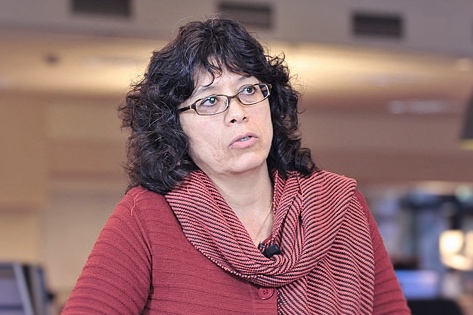Cecilia Méndez, associate professor of History at the University of California-Santa Barbara, will be the keynote speaker at the second edition of Thinking Andean Studies: an interdisciplinary conference (Philadelphia, February 10-11, 2017).
Méndez focus primarily her work on social and political history of the Andean region. Her research highlights the importance of late eighteenth-century, and nineteenth-century political developments in shaping modern conceptions nationhood, citizenship, and “race.”
Keynote Talk: “Foundational Violences: Silences, memory, and fratricide in Peru’s historiographical narratives, 1781-2017”
Saturday, February 11th, 5:00pm – 6:15pm | Widener Room (Penn Museum)
Abstract:
Like other American countries after independence, Peru was engulfed in civil wars throughout the nineteenth century. But the memories of these wars did not shape national political identities in twentieth-century Peru as they did in, say, twentieth-century Colombia, Uruguay, Argentina, or the United States. Rather, the memories of Peru’s nineteenth century civil wars have been overshadowed by those of the War of the Pacific that Peru lost to Chile (1879-1883), and the uprising lead by Túpac Amaru II in 1780-181.
Despite having occurred four decades before the establishment of Peru’s national state, the Túpac Amaru rebellion can be studied as a civil war by virtue of its lingering effects in the country’s memory. But insofar as it was, for the most part, a repressed memory, it was not integrated into an open, explicitly political discourse at the national level, at least until the 1960s. My presentation analyzes the silencing and memories of the Túpac Amaru rebellion and subsequent –mostly indigenous– rebellions (1780-1815) as they manifested themselves in popular and historiographical narratives from shortly after they occurred. It postulates that the erasure of these uprisings from the earliest foundational historiographical narratives of the nation cannot be interpreted as forgetfulness but rather as an uneasiness toward their violent character. Yet, it was not violence per se that unsettled the dominant historiography, as much its remembrance in “ethnic” terms. Put it other words: the rebellion of Túpac Amaru was not silenced because it was violent but because it evoked, in mostly Creole writers, the idea of Indians exerting violence.
My ultimate goal is to decipher a seeming paradox; to wit, how the very country that produced both the major anti-Spanish colonial insurgency in Spanish America prior to the wars of independence, and the bloodiest Marxists guerrilla in the 20th century, crafted one of the most conservative –“insurgency averse” – historical narratives of national foundation in the continent.
For more information about “Thinking Andean Studies” conference, please click here. (deadline for submissions is November 20, 2016)
